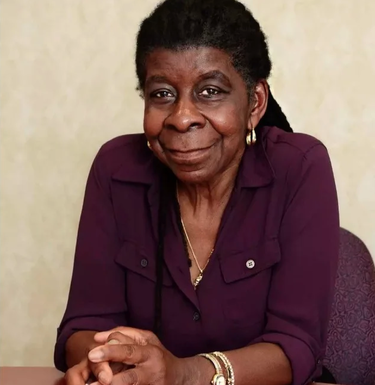From the editor: A freedom-seeker’s legacy
Alice Green burst into my life decades ago like a bright new star in the firmament.
She died unexpectedly when her heart stopped on Aug. 20. She was 84.
I met her when we both served on a panel at the University at Albany, discussing the seeking of truth. The panel included an archaeologist, a mental-health expert, and other journalists.
This was in an era before the term “alternative reality” had been coined. The dialogue centered on whether truth varied with perspective.
Dr. Green believed it did. She had been a social worker and a teacher, an activist and an author, and ran on the Green Party ticket for lieutenant governor. She had earned a doctorate degree in criminal justice and three master’s degrees — in education, social work, and criminology.
She had founded and directed the Center for Law and Justice in Albany. Its motto is from Frederick Douglass: If there’s no struggle, there’s no progress.
Dr. Green did struggle, every day, to make progress, to find freedom, not just for individuals, but by working to change structural racism.
When writing or editing stories involving racism, I would often call Dr. Green for her perspective. She always had something prescient to say.
The call I remember most vividly — I recorded it for a podcast — was just after the uprising in Albany that spread across the county on May 30, 2020.
The uproar occurred after the county had been largely shut down for more than two months to prevent the spread of coronavirus. And it was similar to protests held across the country after the murder of George Floyd.
A peaceful march in Albany during the day had turned to rock-throwing and burning at night.
“I cannot see a connection between anger over the killing of George Floyd and throwing a brick through the window of a public library,” said Albany’s mayor at a county press briefing the next morning. “I don’t see the connection between frustration with police and smashing out the window of a black-owned business and stealing everything inside. That is not protest. That is not accomplishing anything to move a community forward.”
When I called Dr. Green, I heard a different perspective. “Some people call it rioting,” she said. “From our perspective, it’s not. It was an uprising.”
Her views ran at the top of our front page that week with a separate story below giving the views of officials including the county’s executive and sheriff, the city’s mayor and police chief, and the Guilderland Police.
The bannerline read: “An uprising or a riot? Racial tensions explode in Albany.”
Dr. Green’s perspective had informed me and thereby our readers.
America, she noted, has a very long history of violence. For 400 years, violence has been used against people of color, said Dr. Green. “Whiteness is the capital … It’s something that gets you what you want and need … You want to hold onto that power.”
She went on, “I know firsthand about the incarceration of a lot of our people … I can’t stand the thought of someone being caged … Prison looks like enslavement to me. I don’t think we need to put people behind bars,” she said.
“Blacks have a collective memory,” Dr. Green explained, noting her great-grandmother was born enslaved.
“That always bothered me,” she said. “How could you have a country, a society that treats people like animals or some other kind of a tool?” Dr. Green asked. “You own them. You own their bodies and you steal their labor. That’s just wrong. I never got over that.”
Dr. Green also had a grandmother who was a sharecropper, and a mother and father who lived in the Jim Crow South. She grew up in Witherbee in the Adirondacks, one of the few Black families in that small town.
On that call in 2020, Dr. Green said the video of George Floyd, a Black man being crushed to death by a white police officer, had grasped the attention of people around the world.
“What are we doing to each other?” they are asking.
“African Americans have been experiencing this for a very long time,” Dr. Green said. She pointed up the symbolism of having a knee put in a place that chokes the air and life out of someone.
Dr. Green was there in the midst of the uprising in Albany that Saturday night in 2020 when bricks were hurled, windows were smashed, vehicles were burned.
“The chief was not there. The mayor was not there. I was there,” Dr. Green said, rejecting assertions from some officials that outside instigators had caused the riot.
Blaming outsiders, Dr. Green said, is another way to escape talking about structural racism. “You change the subject,” she said.
On that Saturday night, May 30, 2020, she said, people connected and understood what it meant to be one of the group, what it meant to suffer so much, she said.
“They were saying: We need to be heard.” Dr. Green said, while she did not condone violence, it was an opportunity for people to express anger and mistrust.
“If we hear that, it will allow us as a community to think: How do we get beyond white supremacy?”
Racism, Dr. Green said, is in all of our institutions: criminal justice, education, health care, and employment.
“The virus has shown us what happens when people do not have access to good health care,” she said. In Albany and throughout the nation, a disproportionate number of African Americans died of COVID-19.
People often think of racism as an individual act, Dr. Green said, but it is far more insidious than that, ingrained in our institutions.
The core of the problem, Dr. Green said, is how our systems are constructed to treat people differently, often based on racial stereotypes. “Our society has come to believe Blacks are inherently criminal.”
She said of her Center for Law and Justice, “We identify problems in the community and work on developing solutions so the whole community is safe. That’s my police department. I pay taxes.”
In the history of our country and other countries as well, Dr. Green said, there is a widespread sense of superiority among white people who have an advantage because of their color.
“We have a disadvantage because of our color, because we are thought to be not equal and sometimes not even human,” Dr. Green said.
Dr. Green said she herself was angry when she watched the video of George Floyd as “the life was being taken out of him.”
Some people have more control over their anger, she said, while others feel they have to explode; still others feel powerless.
“There are people who, after a while, feel totally powerless and have no hope left in them,” she said.
Dr. Green said again that she did not condone violence but that she understood it. Prosecuting someone, she said, is not addressing the real issue.
“I don’t like to see people hurt,” Dr. Green said. “I don’t like to see people lose their property. When you have no sense of hope … you have no power.”
In essence, Dr. Green said, “People are looking just to be a person and accepted as a person.”
Small acts can give hope, she said, like police officers following Colin Kaepernick’s lead and “taking a knee” during the national anthem to protest police brutality or a police officer in Minneapolis who joined the march against the officer who murdered George Floyd.
But, she went on, the change needs to transform institutions. “People can do small things,” she said, putting themselves in someone else’s shoes. There are things each of us can do.”
She also said, “It’s not going to change overnight.”
Overcoming slavery, she said, “was not easy. It took a long time. But you’ve got to start if you want to finish.”
Dr. Green concluded, “I devoted my life to dealing with ways that we control people and oppress them … I just devoted all of my life to doing something that makes me and other people free.”
I am grateful for your life, Dr. Green, for the warmth of your voice as you spoke your truth.
You ended that conversation by saying the change you had worked so long and so hard for wouldn't happen in your lifetime.
But what I see, writing this just after your death, is the changes you have wrought, the minds you have opened, the accolades coming from every corner — the city police chief, the county executive, the congressman, the New York State Writers Institute, and more.
Each of us need to make progress on what you started: individual acts like respecting and understanding others for who they are, and larger acts that will change the institutions that oppress so many.
You have left a legacy of seeking freedom for others to follow. It will be an enduring North Star.
— Melissa Hale-Spencer



